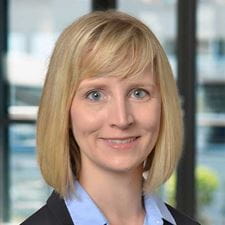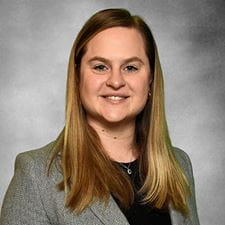
CATALYST Clinical Scholars Program offers multiple paths to research success
By Tyler Griesenbrock
CATALYST scientific editor
 Productive, independent researchers are at the core of scientific exploration, including in health services and implementation science research – but that does not mean each of those researchers arrives at that destination by following the same path.
Productive, independent researchers are at the core of scientific exploration, including in health services and implementation science research – but that does not mean each of those researchers arrives at that destination by following the same path.
For the CATALYST Clinical Scholars Program – established by the Center for the Advancement of Team Science, Analytics, and Systems Thinking in Health Services and Implementation Science Research at The Ohio State University – that diversity in backgrounds is an asset in the quest to develop the next cohort of clinician researchers.
The program, also the home for fellows who are supported by the ACCELERATE T32 postdoctoral training grant funded by the Agency for Healthcare Research and Quality, offers multiple training tracks for the varied scholars who join each two-year cohort of participants.
Learn more about the CATALYST Clinical Scholars Program
For Ohio State’s Julia Agne, MD, an associate professor in the Department of Internal Medicine’s Division of Palliative Medicine, the chance to receive formal training in research project development was what first drew her interest.
“I was already pretty far along in my clinical career. I had always been interested in health services research, but I didn’t have any experience with it,” Dr. Agne said. “Last year, I applied for my first grant, and it was funded. I realized I needed training.”
She turned to the person who had helped her put that grant together: Ann Scheck McAlearney, ScD, MS, one of the leaders of the CCSP as well as the Executive Director of CATALYST, Associate Dean for Health Services Research, and Distinguished Professor in the Department of Family and Community Medicine.
“Ann introduced me to the Clinical Scholars Program,” Dr. Agne said. “I’ve been blown away by how amazing it has been.”
 Her involvement with the program also led to an introduction to Amanda Gusovsky Chevalier, PhD, MPH, who had taken a different path to participation.
Her involvement with the program also led to an introduction to Amanda Gusovsky Chevalier, PhD, MPH, who had taken a different path to participation.
“I finished my PhD about a year ago in spring 2023. I have no clinical background,” Dr. Gusovsky Chevalier said. “There were a couple of career options for me; the main one was to work in a pharmaceutical company. But I thought an academic path would be more well suited to me.”
After a meeting with Dr. McAlearney, she found a position as a post-doctoral researcher with CATALYST and is now supported by the T32 grant. She also spoke to another of the CCSP’s leaders, Jim Burke, MD, MS, Co-Director of Neurology Health Services Research, Professor of Neurology, and Endowed Professor of Health Services Research.
Dan Jonas, MD, MPH, Director of the Division of General Internal Medicine and Geriatrics, Director of the Primary Care Research Fellowship, Professor of Medicine, and Endowed Professor of Health Services Research, also serves as co-director for the CCSP.
“The Clinical Scholars Program was a bonus for me that I didn’t know about before I got here,” Dr. Gusovsky Chevalier said. “I have learned and developed a lot through that program as a researcher.”
Although their routes to the CCSP were different, that kind of flexibility is built into the program, allowing scholars with varying starting points and goals to participate in team science efforts. It also gave Drs. Agne and Gusovsky Chevalier the chance to meet one another.
“Amanda had just started her postdoc here, and we happened to be in the same CATALYST meeting, a qualitative learning circle,” Dr. Agne said. “When I heard she had experience in pharmaceutical research, it pinged in my head. I needed help with data analysis that was beyond my expertise.”
The project Dr. Agne had in mind was examining the use of urine drug screening in patients with lung cancer and its potential influence on patient care.
“In palliative care, we prescribe a lot of controlled substances, and routine urine drug screening is recommended for monitoring these high-risk medications,” she said. “More research is needed to study the impact of urine drug screening for patients during cancer care.”
The two have been working together on the research project since their first encounter. Such impromptu meetings that lead to lasting collaboration are part of the goal of the CCSP.
“The CATALYST Clinical Scholars Program has been a terrific experience overall, and one that enables these collaborations,” Dr. Gusovsky Chevalier said. “Julia and I have very different backgrounds, and the same is true for everyone in the group. We really learn from one another, which is powerful from a team science perspective. We get into these incredible discussions about best practices. It’s just an amazing opportunity for learning and growth.”
Dr. Agne added: “Everyone in the program is teamed up with a mentor who can really guide your research and career development. You have a primary mentor, but everyone else involved in the program is willing to help you with your work.”
That mentorship is an integral part of the CCSP, in which faculty researchers work closely with scholar participants to guide the development of their research and leadership skills.
“The CATALYST Clinical Scholars Program is agnostic to your field of research or clinical medicine,” Dr. Agne said. “You’re viewing this through the lens of health services research. It’s multidisciplinary and interdisciplinary – you get a wide perspective outside your own area of expertise.”
Both Dr. Agne and Dr. Gusovsky Chevalier emphasized the breadth and depth of opportunities their participation in the CCSP afforded to them. Those opportunities included the chance to hear from myriad experts from settings across Ohio State on a weekly basis.
“As someone who just started a position with Ohio State, it has been a great opportunity to expand my network and meet people across the university,” Dr. Gusovsky Chevalier said. “There’s no downside to it. I can’t say enough good about it.”
Among its various tracks, the program also offers the chance earn graduate credits that can lead to a master’s degree. That opportunity to do graduate-level coursework can support endeavors such as applications for career development grants.
For Dr. Agne, the master’s track is a good fit for her as a clinician.
“I’m using the program as a launching point for my transition from fully clinical to a clinical research career. I’m using this program to build my application for a career development award,” she said. “Running my own supportive care clinical trials is my ultimate goal.”
Other CCSP participants take the opportunity to gain teaching experience. Dr. Gusovsky Chevalier, for example, has led one of the CCSP quantitative class sessions. And her sights are set even higher.
“I’m also using it as a launching pad into my career in academic research,” she said. “I would like to be involved in CATALYST. There are more opportunities to collaborate as we go forward. The future is really bright.”
For more information about the CATALYST Clinical Scholars Program, visit go.osu.edu/ccsp. For details about CATALYST, visit go.osu.edu/catalyst.
